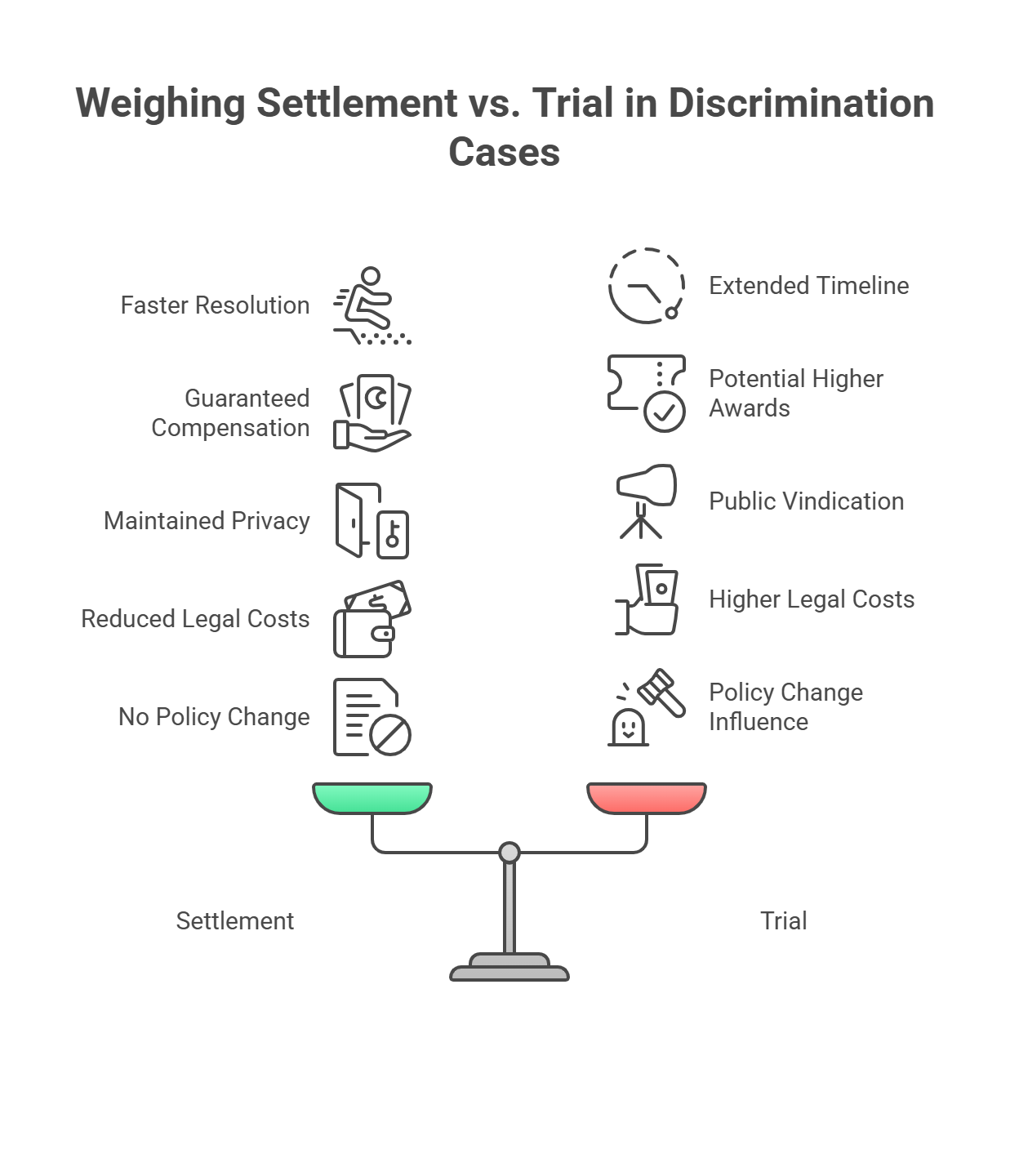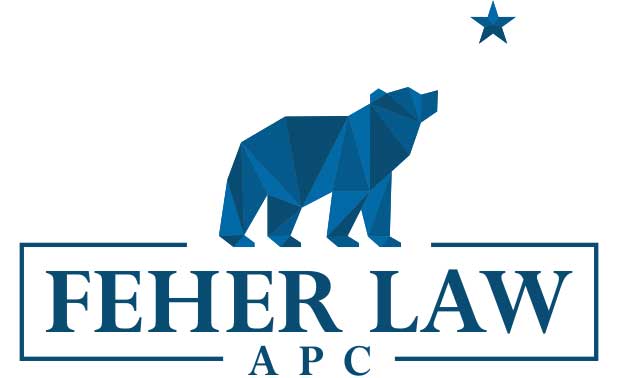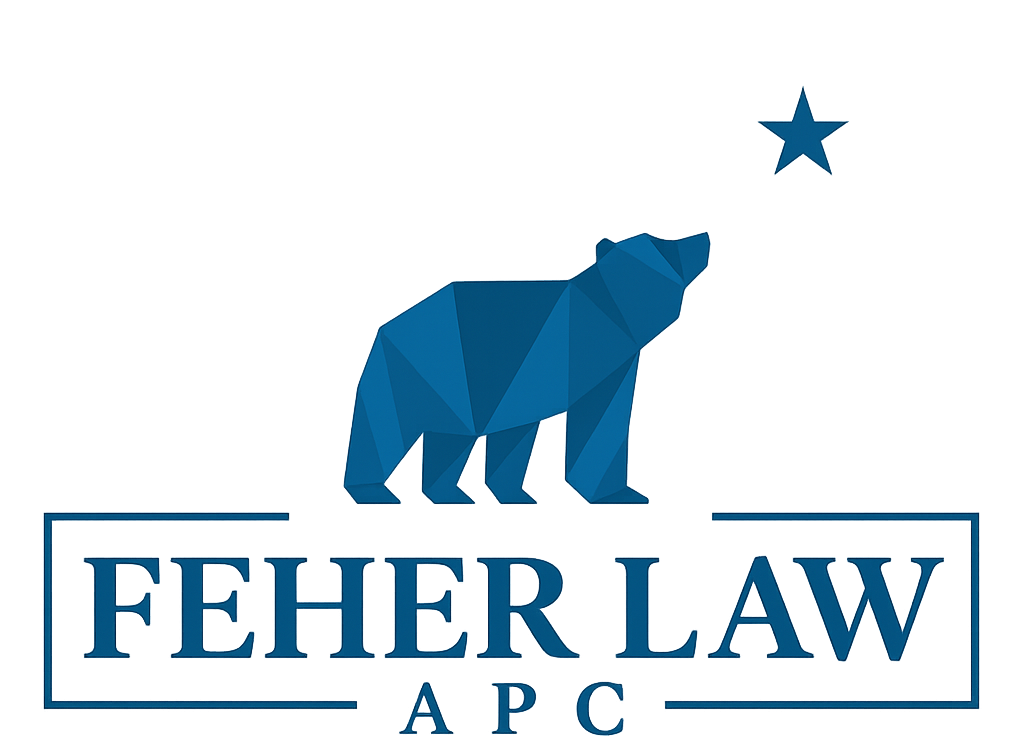Average Promotion Discrimination Settlements in California

Average promotion discrimination settlements in California typically range from $60,000 to $250,000, with most cases falling within this range, depending on the severity of the discrimination and the impact on the individual’s career.
When qualified employees are repeatedly passed over for advancement opportunities, the financial and emotional toll extends far beyond a missed promotion. Being denied career progression due to discriminatory reasons can derail years of professional development and result in substantial lost earnings.
For many California workers facing this situation, understanding potential settlement values becomes important when deciding whether to pursue legal action.
The decision to challenge workplace discrimination requires careful consideration of the financial realities involved. While no amount can fully compensate for the career setback and emotional distress caused by discriminatory practices, California’s strong employment protections under the Fair Employment and Housing Act (FEHA) provide substantial remedies for victims of promotion discrimination.
Our experienced legal team has secured significant settlements for employees who faced discriminatory promotion practices. Notable results from our employment law cases include:
- $7,000,000: Civil Rights settlement in Los Angeles
- $1,400,000: Employment – Wrongful Termination settlement in Los Angeles
- $1,000,000: Wrongful Termination settlement in Los Angeles
Our Huntington Beach workplace discrimination lawyer team is ready to evaluate your case and fight for the compensation you deserve.
Promotion Discrimination Settlement Amounts in California in More Detail
Settlement amounts for failure-to-promote cases vary significantly based on the specific circumstances, the strength of the evidence, and the individual’s career trajectory. Understanding these ranges helps employees make informed decisions about pursuing legal action.
The following scenarios represent common promotion discrimination cases we encounter, each carrying different settlement potential based on the unique factors involved.
| Case Type | Typical Settlement Range | Key Factors |
|---|---|---|
| Entry-Level Position Denial | $60,000 – $100,000 | Limited career impact, shorter employment history |
| Mid-Level Management Role | $100,000 – $180,000 | Moderate career setback, documented performance |
| Senior Executive Position | $180,000 – $250,000 | Substantial financial impact, clear evidence |
| Multiple Promotion Denials | $150,000 – $250,000 | Pattern of discrimination, extended timeline |
Lower Range Settlements ($60,000 - $100,000)
These settlements typically occur when an employee was denied an entry-level promotion or when the career impact remains relatively contained. Cases in this range often involve employees with shorter tenure or positions where the salary differential between current and desired roles is moderate.
Mid-Range Settlements ($100,000 - $180,000)
The majority of promotion discrimination cases fall within this range. These situations typically involve employees with established track records who were denied advancement to supervisory or specialized positions. Documentation of qualifications and evidence of discriminatory treatment play key roles in achieving settlements within this range.

Higher Range Settlements ($180,000 - $250,000)
Complex cases involving senior positions, multiple discriminatory acts, or particularly egregious employer conduct can result in substantial settlements. These cases often include extensive economic damages reflecting significant lost earnings potential and may involve punitive damages when employer behavior is especially harmful.
Estimate Your Promotion Discrimination Settlement
Understanding your potential settlement value requires careful analysis of multiple factors specific to your situation. Our discrimination lawsuit settlement calculator provides an initial estimate based on key elements of your case.
This tool considers various damage types, including lost wages, emotional distress, and potential punitive damages, to provide a preliminary assessment of your claim’s value.
Disclaimer: The results provided by this discrimination lawsuit settlement calculator are for informational purposes only and do not constitute legal advice. The estimates are based on general inputs and do not reflect the unique details of your case, such as jurisdictional laws or liability factors.
Factors That Determine Your Settlement Value
Multiple variables influence the final settlement amount in promotion discrimination cases. Understanding these factors helps employees develop realistic expectations about potential compensation.
The strength of your evidence significantly impacts settlement negotiations. Clear documentation of discriminatory conduct, witness testimony, and records demonstrating your qualifications for the denied position all contribute to higher settlement values.
- Your position level and salary: Higher-earning positions naturally result in greater economic damages due to the substantial difference in compensation between current and denied roles. Senior executives and specialized professionals typically see larger settlements than entry-level employees.
- Length of discrimination: Cases involving repeated denials over extended periods demonstrate a pattern of discriminatory behavior. This ongoing conduct not only increases economic damages but may also support claims for punitive damages.
- Employer’s conduct: Particularly egregious behavior by management, such as explicit discriminatory statements or retaliation against employees who complain, can substantially increase settlement values through punitive damage awards.
- Company size and resources: Larger employers with substantial resources may offer higher settlements to avoid lengthy litigation and negative publicity. The California Department of Industrial Relations provides valuable wage data that helps establish economic loss calculations.
- Strength of legal representation: Our experienced employment attorneys, who understand California’s complex discrimination laws, can identify additional damage categories and negotiate more effectively with opposing counsel.
Our California workplace discrimination attorney will thoroughly evaluate these factors to maximize your potential recovery.
Types of Damages Available in Promotion Discrimination Cases
California law provides multiple forms of compensation for victims of workplace discrimination. Understanding these damage categories helps employees appreciate the full scope of potential recovery in their cases.
The comprehensive nature of California’s employment protection laws allows for recovery of both economic and non-economic damages, with additional punitive damages available in cases involving particularly harmful employer conduct.
| Damage Type | Calculation Method | Typical Recovery Range |
|---|---|---|
| Back Pay | Lost wages from the denial date | $20,000 – $80,000 |
| Front Pay | Future lost earnings | $30,000 – $120,000 |
| Lost Benefits | Healthcare, retirement, stock options | $5,000 – $25,000 |
| Emotional Distress | Impact on mental health | $15,000 – $75,000 |
| Punitive Damages | Punishment for egregious conduct | $10,000 – $50,000 |
In promotion discrimination cases, employees may be entitled to various forms of compensation, including economic, non-economic, and punitive damages. However, two critical elements that often shape both the outcome of a case and its broader impact are attorney fees and injunctive relief.
Attorney Fees
Under California’s Fair Employment and Housing Act (FEHA), successful claimants are entitled to recover reasonable attorney fees and litigation costs. This provision is designed to ensure that victims of discrimination can access legal representation, even if they can’t afford it upfront. It also incentivizes attorneys to take on meritorious cases that serve the public interest.
Injunctive Relief
In addition to monetary damages, courts can grant injunctive relief — court orders requiring the employer to take specific actions. This might include revising promotion policies, implementing anti-discrimination training, or reinstating a wrongfully denied promotion. Injunctive relief not only helps correct past discrimination but also aims to prevent future violations by changing systemic workplace practices.
✔️ Learn more in our comprehensive discrimination lawsuit settlement guide.
Economic Damages: Calculating Your Financial Losses
Economic damages form the foundation of most promotion discrimination settlements, representing the measurable financial harm resulting from discriminatory conduct. These calculations require careful analysis of salary differentials, benefit packages, and career trajectory impacts.
Back pay calculations begin from the date you should have received the promotion and continue until the resolution of your case. This includes not only base salary differences but also bonuses, commissions, overtime opportunities, and other compensation tied to the denied position.
💡 Hypothetical Scenario: A marketing professional earning $75,000 annually was denied promotion to marketing manager (salary: $95,000) due to age discrimination. Over two years, the back pay calculation would include the $20,000 annual salary difference ($40,000 total), plus lost bonuses averaging $8,000 annually ($16,000), resulting in $56,000 in back pay damages before considering benefits and front pay. The total settlement in this case reached $125,000.
Front pay represents future lost earnings when reinstatement to the denied position isn’t feasible. California courts typically award front pay for reasonable periods, often 1-3 years, though exceptional cases may warrant longer periods based on the employee’s career prospects and the employer’s discriminatory conduct.
Lost benefits constitute a significant component often overlooked in initial damage calculations. Health insurance premiums, retirement plan contributions, stock options, and professional development opportunities all carry monetary value that should be included in economic damage assessments.

Non-Economic Damages: Compensation for Emotional Harm
Promotion discrimination inflicts substantial emotional and psychological damage beyond measurable financial losses. California law recognizes these intangible harms and provides compensation for the mental anguish suffered by discrimination victims.
The emotional impact of being denied advancement due to discriminatory reasons extends beyond workplace frustration, often causing depression, anxiety, damaged self-esteem, and strained personal relationships. California courts have awarded substantial non-economic damages, recognizing these serious psychological consequences.
💡 Hypothetical Scenario: A qualified software engineer was repeatedly passed over for team lead positions despite superior performance reviews, while less qualified younger colleagues received promotions. The ongoing discrimination caused severe anxiety, requiring therapy and medication, while damaging her professional confidence and reputation within the industry. Her settlement of $165,000 included $45,000 for emotional distress.
Professional reputation damage represents another significant component of non-economic harm. When discrimination becomes known within an industry, it can affect future employment opportunities and professional relationships, extending the harm far beyond the immediate workplace.
California’s approach to emotional distress damages considers both the severity and duration of the discriminatory conduct. Isolated incidents typically result in lower awards, while sustained patterns of discrimination over extended periods can justify substantial non-economic damage awards.
Punitive Damages: When Employers Face Additional Penalties
Punitive damages under Civil Code § 3294 serve to punish employers for particularly egregious discriminatory conduct and deter similar behavior in the future. California law provides broader access to punitive damages than federal employment statutes, making these additional penalties an important consideration in settlement negotiations.
⚠️ Punitive damages require clear and convincing evidence that the employer acted with malice, oppression, or fraud. Simple negligence or inadvertent discrimination typically doesn’t qualify for these enhanced penalties.
To qualify for punitive damages, the discriminatory conduct must demonstrate a conscious disregard for the employee’s rights or involve intentional, harmful behavior. Examples include explicit discriminatory statements by management, retaliatory conduct following discrimination complaints, or systematic exclusion of protected class members from advancement opportunities.
Federal law caps punitive damages based on employer size, ranging from $50,000 for smaller employers to $300,000 for companies with 500 or more employees. However, California state claims aren’t subject to these federal limitations, potentially allowing for higher punitive damage awards in appropriate cases.
The availability of punitive damages significantly strengthens settlement negotiations, as employers face the risk of substantial additional penalties beyond compensatory damages. Insurance policies often exclude coverage for punitive damages, meaning employers may face personal liability for these awards.
Contact our experienced employment discrimination attorneys today for a free consultation and find out how we can help you pursue justice and compensation for your promotion discrimination case.
Settlement vs. Trial: Understanding Your Options
Most promotion discrimination cases resolve through settlement negotiations rather than proceeding to trial. Understanding the advantages and disadvantages of each approach helps employees make informed decisions about their case strategy.
The Equal Employment Opportunity Commission (EEOC) reports that approximately 85% of employment discrimination cases settle before trial, reflecting both parties’ desire to avoid the uncertainty and expense of litigation.
- Settlement advantages: Faster resolution typically within 6-18 months, guaranteed compensation without trial risk, maintained privacy through confidential agreements, and reduced legal costs and emotional stress.
- Settlement disadvantages: Potentially lower compensation than trial verdicts, no public vindication or precedent-setting opportunity, and inability to seek changes in employer policies through court orders.
- Trial advantages: Potential for higher damage awards, including full punitive damages, public vindication and accountability for discriminatory conduct, and court-ordered injunctive relief requiring policy changes.
- Trial disadvantages: Extended timeline often 2-4 years, risk of losing and receiving no compensation, higher legal costs and attorney fees, and public exposure of personal employment details.
- Mediation requirements: California courts often require mediation before trial, providing a structured settlement negotiation process with neutral third-party assistance in reaching a resolution.
The Los Angeles County Superior Court hears employment cases through its civil division and provides general resources on case timelines and procedures that apply to civil litigation, including wrongful termination and discrimination lawsuits.
| Comparison Factor | Settlement | Trial |
|---|---|---|
| Timeline | 6-18 months | 2-4 years |
| Settlement Range | $60,000 – $250,000 | $60,000 – $250,000+ |
| Certainty | Guaranteed outcome | Uncertain outcome, decided by jury |
| Privacy | Confidential | Public record |
| Costs | Lower legal fees | Higher expenses |

How Settlement Negotiations Work in California
Settlement negotiations follow a structured process designed to reach mutually acceptable resolutions while avoiding the costs and uncertainties of trial. Understanding this process helps employees participate effectively in securing favorable outcomes.
California’s employment discrimination settlement process typically begins after completing the administrative complaint process with the Civil Rights Department and receiving a right-to-sue notice.
- Initial demand preparation: Our attorney will prepare a comprehensive demand letter outlining the discriminatory conduct, legal violations, and detailed damage calculations, including economic losses and non-economic harm.
- Discovery process: Both parties exchange relevant documents, conduct depositions, and gather evidence to support their positions, providing the factual foundation for meaningful settlement discussions.
- Mediation scheduling: Courts typically require mediation before trial, though parties can voluntarily engage in settlement discussions at any point during the litigation process.
- Negotiation rounds: Settlement discussions often involve multiple rounds of offers and counteroffers, with each party adjusting its position based on case developments and risk assessments.
- Final documentation: Successful negotiations result in detailed settlement agreements addressing compensation, confidentiality terms, and any non-monetary relief such as policy changes or neutral references.
- Court approval: Some settlements require judicial approval, particularly in cases involving injunctive relief or when minors are involved in the discriminatory conduct.
📌 Filing complaints with the California Civil Rights Department begins the administrative process required before litigation.
Maximizing Your Promotion Discrimination Settlement
Strategic preparation and evidence development significantly impact settlement outcomes. Employees who document discriminatory conduct and work with experienced legal counsel typically achieve higher compensation than those who attempt to navigate the process independently.
Early documentation proves key in building strong discrimination cases. Maintaining detailed records of performance evaluations, promotion criteria, and discriminatory statements provides the evidentiary foundation necessary for successful settlement negotiations.
- Comprehensive evidence collection: Gather all performance reviews, job postings for denied positions, emails containing discriminatory content, and witness contact information from colleagues who observed discriminatory treatment.
- Expert witness utilization: Employment experts can analyze promotion practices, salary surveys, and industry standards to demonstrate the discriminatory nature of employer decisions and calculate appropriate damages.
- Timing considerations: Filing complaints promptly after discriminatory incidents occur preserves evidence and witness memories while demonstrating the serious impact of the employer’s conduct.
- Professional demeanor: Maintaining professionalism throughout the process, avoiding retaliatory behavior, and continuing to document any ongoing discrimination strengthens your credibility and legal position.
- Alternative dispute resolution: Participating constructively in mediation and settlement conferences demonstrates reasonableness while preserving your right to proceed to trial if negotiations fail.
- Media and social media caution: Avoiding public statements about ongoing legal proceedings protects settlement negotiations and prevents employers from using your statements against your interests.
Common Settlement Mistakes to Avoid
Understanding common pitfalls in discrimination settlement negotiations helps employees protect their interests and avoid actions that could reduce their ultimate recovery.
Many employees inadvertently harm their cases through well-intentioned but problematic actions during the settlement process.
- Accepting initial offers: Employers’ first settlement offers typically represent their minimum acceptable resolution, not the full value of your claim. Initial offers often fall in the $60,000-$80,000 range when full cases may be worth $150,000-$250,000 with proper negotiation.
- Inadequate documentation: Failing to maintain detailed records of discriminatory incidents, performance evaluations, and witness information weakens your negotiating position and may prevent recovery of full damages.
- Premature case resolution: Settling before understanding the full scope of damages, including long-term career impact and ongoing medical treatment for emotional distress, can result in inadequate compensation.
- Confidentiality concerns: Agreeing to overly broad confidentiality provisions may prevent you from discussing the discrimination with potential future employers or providing references for other discrimination victims.
- Tax implications: Failing to consider tax consequences of settlement proceeds can result in unexpected tax liability, effectively reducing your net recovery from the discriminatory conduct.
- Inadequate legal representation: Attempting to negotiate complex employment settlements without experienced legal counsel often results in lower compensation and unfavorable agreement terms.
Our Torrance workplace discrimination lawyer team helps clients avoid these common mistakes while maximizing their settlement recovery.
Working with Feher Law: Why Trust in Us
At Feher Law, we understand that promotion discrimination cases involve more than legal technicalities; they represent your career aspirations, financial security, and professional dignity. Our approach combines aggressive advocacy with compassionate client service to achieve the justice you deserve.
Our track record speaks to our commitment to securing substantial settlements for discrimination victims. We’ve recovered millions of dollars for employees who faced workplace discrimination, including significant awards in promotion discrimination cases. This success stems from our thorough case preparation, strategic negotiation skills, and willingness to take cases to trial when necessary.
Every promotion discrimination case receives individualized attention from our experienced legal team. We begin by conducting comprehensive investigations to uncover all evidence of discriminatory conduct, consulting with employment experts to establish the full scope of damages, and developing litigation strategies tailored to your specific circumstances.
We understand the financial pressures facing discrimination victims and work on a contingency fee basis, meaning you pay nothing unless we secure compensation for your case. This arrangement allows you to pursue justice without worrying about upfront legal costs while ensuring we’re fully invested in achieving the best possible outcome.
Contact our experienced employment discrimination attorneys today at (310) 340‑1112 for a free consultation to discuss your promotion discrimination case and learn how we can help you seek the compensation you deserve.

FAQs
How long does it take to reach a promotion discrimination settlement in California?
Most promotion discrimination settlements in California resolve within 12-24 months from filing, though complex cases involving multiple claims or extensive discovery may take longer to reach resolution.
Will my employer's insurance company handle the settlement?
Many employers carry employment practices liability insurance that covers discrimination settlements, though coverage terms vary and some policies exclude certain types of discriminatory conduct or punitive damages.
Can I negotiate my settlement amount, or is the first offer final?
Settlement offers are typically negotiable, and initial offers rarely represent the employer’s final position. Experienced employment attorneys can often secure significantly higher compensation through strategic negotiation.
What happens to my settlement if I find a new job during the process?
Finding new employment during settlement negotiations may reduce front pay damages, but it doesn’t eliminate your right to back pay, emotional distress compensation, or other damages resulting from discriminatory conduct.
Do I have to pay taxes on my entire settlement amount?
Settlement taxation depends on the specific damage types involved. Back pay and punitive damages are typically taxable, while emotional distress compensation may qualify for tax-free treatment under certain circumstances.
Can I get a settlement even if I can't prove I would have definitely gotten the promotion?
California law doesn’t require absolute certainty about promotion outcomes. If you can demonstrate you were qualified and the employer’s decision was discriminatory, you may still receive compensation for the violation.
Related Posts

Pedestrian Injured in Hollywood Car Accident

Colorado QB Dies in Single-Car Accident

Can I Sue a Drunk Driver in California?

Two Killed, Three Injured in Moorpark Head-On Crash




